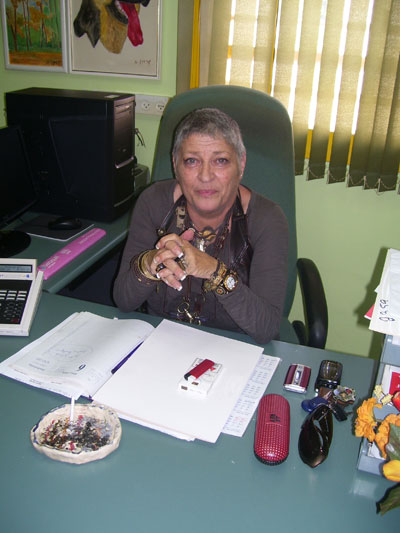Much of the international community and even Israelis living outside the western Negev periphery, are under the impression that rocket fire against Sderot and southern Israel has completely ceased. Israeli news websites and radio stations have carried reports asserting that the number of rockets fired against Israelis in the south has reached all time lows.
While it is true that rocket fire has significantly decreased, Sderot and western Negev residents are still reeling from the impact of the war. The director of the Sderot Mental Health Center, Dr. Adrianna Katz told Sderot Media Center yesterday that area residents are streaming into her clinic, seeking therapy for developing ‘post-war’ trauma symptoms.
Dr. Adriana Katz
“Many new Sderot patients are coming in for help, even though they have lived with the rocket terror for eight years now,” says Dr. Katz. “PTSD symptoms among area residents emerge during periods of ‘quiet’ like now. Many seeking therapy had tried unsuccessfully on their own to suppress these symptoms of trauma during the past rocket escalations.”
PTSD or post-traumatic-stress-disorder is an anxiety disorder which develops after exposure to a terrifying event ordeal which physical harm occurred or was threatened. People suffering from PTSD have a severe an ongoing emotional reaction to extreme psychological trauma. Symptoms include flashbacks and nightmares, difficulty falling asleep, numbness and detachment-all of which impair social and familial relationships as well as performance at work.
Victims of PTSD often avoid stimuli associated with their trauma. In Sderot, it is often impossible for residents to escape the reality that has brought on the trauma symptoms because of the fragile quiet. Dr. Katz explained that recovering patients who hear the Color Red siren just once-the alarm that sends civilians fleeing to shelters– will go back to experiencing PTSD symptoms.
Indeed, since the ceasefire in mid-January, the Color Red siren has been set off almost weekly in Sderot.
“During the war, my staff discovered a new type of anxiety that developed among Sderot residents, which we termed ‘optimistic anxiety,’“ said Dr. Katz. “Although residents were fearful of the rocket fire, they also experienced for the first time in years– a sense of optimism that the operation would completely end the rocket terror.”
“However, Sderot residents do not believe that the operation brought about a complete nor lasting change as it was finished halfway. In fact, because the rocket attacks have spread as far as Netivot, Ashdod, and Be’er Sheba, Sderot residents feel even less secure,” Dr. Katz related.
“Many families left Sderot during the war and traveled to nearby cities which they believed were safe from rocket attacks, only to find out they were not. This fact, which was revealed during the war, has spurred on further anxiety among patients.”
Over 5, 500 patient files have opened in the Sderot Mental Health, who has a staff of four counselors, since Palestinian rocket fire on the city began in 2002. Out of those files, 2,500 are active, with many patients seeking treatment for the long term, said Dr. Katz. She did not have an exact number on how many new patients have come in for treatment since the war.
Dr. Katz believes that there are many more PTSD victims in Sderot who are not seeking help. Most residents who do come to Dr. Katz are referred to by a doctor or medical expert, while few arrive by their own initiative.
Dr. Katz offers a small smile when I ask her if she has any hope for a lasting peace in the region. “Not at this moment,” she says as she gets ready to greet her next patient.











